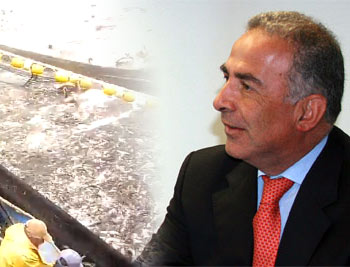|

The head of the Subsecretariat of Fisheries, Pablo Galilea. (Photo: Subpesca/FIS)
Lower mackerel quota to impact on employment
 CHILE
CHILE
Wednesday, November 10, 2010, 03:20 (GMT + 9)
The head of the Subsecretariat of Fisheries (Subpesca), Pablo Galilea, has expressed concerns over the poor state of some fisheries in the country, the decrease in horse mackerel quotas for 2011 and the effect that this may have on the merging of jobs in the sector.
However, he stated that much of the personal adjustment is now complete.
"It is said that a total of 350,000 tonnes of horse mackerel could be captured in the whole of the South Pacific area, which means Chilean quota levels will be just over 200,000 tonnes," said the subsecretariat during an interview with Estrategia. "So drop is considerable from the 1,300,000 tonnes in 2010 to less than half of what is being captured to date. Fishing quotas would remain at these levels, at least, for a couple of years," he added.
With regards to the workforce, executives from Pesquera San José and SouthPacific Korp (SPK) have advanced as a result of the merger between both companies, which will leave around 200 employees without jobs, about one-fifth of the total work-force, confirmed the respective executives.
When they announced the integration business, in July, the two companies explained that the main objective pursued was to achieve a set of capabilities addressing the shortage of mackerel, the main marine resource extracted in south-central Chile.
In this regard, Galilee said: "This situation [the mergers] may worsen due to the low quota of horse mackerel that we are to propose in the National Board of Fisheries in December, to make the resource sustainable."
When asked about the new outbreak of the infectious salmon anemia (ISA) virus in a farming center in the region of Magallanes, the subsecretary reiterated that Chile will have to have to live with the disease, because "eradicating the virus is practically impossible."
"The law and regulations are in the direction of learning to live with them, particularly with the ISA virus, with a supervisory compliance that is very severe," he added.
In this sense, the director of Ecoceanos, Juan Carlos Cardenas, warns that "no sustainable change will ensure that no other salmon crisis occurs in the region of Magallanes."
"This first outbreak of ISA in Magallanes waters occured when the authority and the industry have asked for 1,600 new licenses, with the goal to increase salmon production by 1,300 per cent during this decade. All these are signs that indicate that Magallanes will repeat this same situation of environmental health and social crisis that has already occurred in the region of Los Lagos," he said, according to Radio Universidad de Chile.
Meanwhile, Galilee recalled that on Tuesday, they submitted Act Nº 20,434 to the National Fish Health Regulations (RESA) and Environmental Regulation (RAMA), which will become the heart of the new Aquaculture laws.
"We will submit a bill that deals only with environmental and health issues but also what we want to create are macro zones, by trying to make watertight compartments that are managed independently. The idea is that everything we want there will be serviced regularly," said the Subsecretary of Fisheries.
"By 11 April 2011, all of the regulations will have been adopted. We would have liked to have a discussion process shorter and less complex, but there are matters where there are different types of interests. After all the divisions that have occurred in the Association for the Chilean Salmon Industry AG (SalmonChile), which we deplored," he said.
For its part, the director of the National Fisheries Service (Sernapesca), Félix Inostroza, confirmed that the audit is a long and difficult process for a number of institutions and sectors related to the industry.
"In the process, many institutions that are mixed must all agree. For example, the new regulations state that ships will have satellite positioning, with this we are able to monitor them, with that we will be able to see where they are fishing and who is fishing. However, we also need to build shipping lanes, so that vessels that are in a health area do not go to another health area, but we will have to discuss shipping routes with the maritime authority," he said.
Related articles:
- ISA virus detected in Magallanes
- The salmon industry is 'at its best health'
By Analia Murias
[email protected]
www.seafood.media
|



